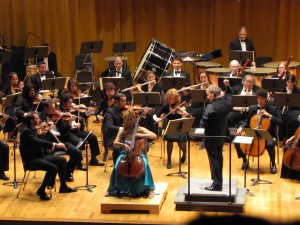
Miami Symphony Makes Move to Bigger Future
Allison Eldredge solos with the Miami Symphony on Sunday.
How does one go about rebranding a symphony orchestra?
If you’re the Miami Symphony Orchestra, you get this message across: We want to be a world-class orchestra, and we’re taking big steps to get there. The group has hired its first director of development, has a new executive director, and has named the Venezuelan conductor Eduardo Marturet as its music director.
And judging by what I heard Sunday evening at Gusman Hall, it really is an orchestra with promise, and perhaps there may be something to its dream of becoming a world-class band.
The Miami orchestra presented three widely varied works, including the Dvorak Cello Concerto (with Allison Eldredge as soloist) and the Shostakovich Ninth Symphony, and opening with a world premiere: La Luz y Su Desvio (Light and Its Changes), a brief tone poem by a University of Miami composition student named Andres Cremisini.
It was good of Marturet to program something brand-new for the concert, when he could easily have gone a much safer route. Cremisini’s piece was very much in the style of many contemporary compositions — largely atonal, and concerned more with sound patterns than narrative — and shows that he’s learned his lessons well. La Luz y Su Desvio began with a low rumble that led to string players moving their hands up and down their fingerboards for a squeaky chorus of harmonics, perhaps suggesting shimmers of light.
The heart of the work consisted of several lines playing against each other, with minor seconds and major sevenths prominent, creating a kind of busy sound collage that was interesting if not very purposeful, but that built to a powerful climax.
Cremisini orchestrates effectively, and knows how to get a wide variety of sounds out of the instruments, so his piece made a forceful impression. La Luz y Su Desvio is not original in any significant way, but it is competently and honestly crafted, and its composer could have a career in film music in his future.
Allison Eldredge, a cellist who teaches at the New England Conservatory, proved to be a fine advocate for the Dvorak, which is by common consent the greatest of all cello concerti. She produces a beautiful, dark tone quality that was well-suited for the composer’s late Romantic idiom, and for this work’s abundance of rich, memorable melody. Eldredge’s technique was admirable as well, and the multiple moments of virtuoso display held no terrors for her.
This was a fine reading of this concerto, and one in which huge, aggressive attacks were not to be found; Eldredge played with a kind of tense lyricism that was very attractive.
Eldredge and Marturet were good collaborators, frequently checking with each other about tempos; there were a couple moments throughout the concerto in which it took some time for the Miamians to match Eldredge, but soon everyone was on the same page. The orchestra accompanied its soloist snugly other than that, and aside from an inaccurate entrance from the trumpets in the coda of the first movement (through which the orchestra gamely soldiered on), its performance was laudable.
It was the Shostakovich symphony, a Prokofiev-style jeu d’esprit that requires nimble work from each section of the orchestra, particularly the winds and violins, that was most impressive. Strings played with precision and fire, as did the winds, which bubbled away with the sparkle requisite to give this music the proper feeling of athleticism.
The large, round sound bassoonist Geoffrey Hale gave to his fourth-movement solo added nobility and dignity, and Marturet judged this very exposed music well, making a sharp contrast between the unison brass motifs and the soft low-string chords that followed. Overall, it was a spirited, strong rendition of this symphony, and one that says encouraging things about this orchestra as it attempts to carve out a bigger role for itself on the South Florida classical scene.
You can hear it for yourself this Saturday, when the Miami SO plays the Shostakovich again on a program with the Capriccio Italien of Tchaikovsky. The Dvorak Cello Concerto will be heard again, too, this time with the 15-year-old cello standout Anna Litvinenko as soloist. The concert starts at 8 p.m. Saturday in the Lincoln Theatre on Miami Beach.